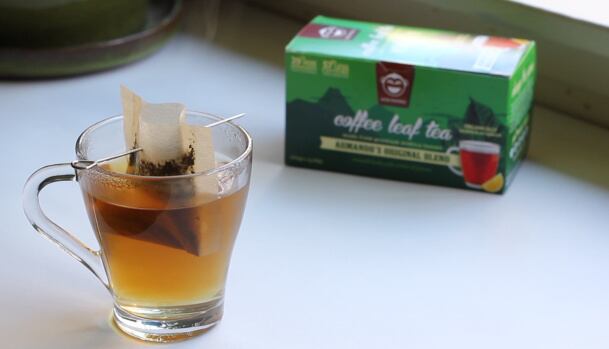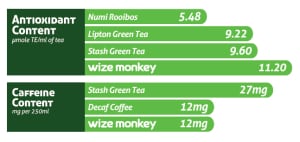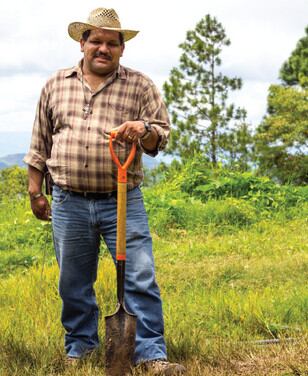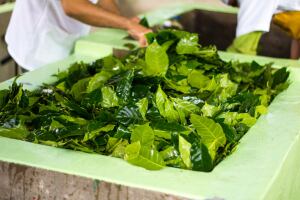One company taking a gamble on this is Vancouver based start-up Wize Monkey, which is preparing to launch its first organic coffee leaf teas next spring.
The first product will be loose coffee leaf tea, followed by tea bags and ready-to drink beverages, which founders Max Rivest (CEO) and Arnaud Petitvallet (COO) hope will offer consumers something novel and refreshing, and create a more sustainable livelihood for coffee growers in Nicaragua and other growing regions.
It’s got the body and full flavor of black tea without the bitterness
But what does it taste like?
Earthy, slightly sweet, and not as bitter as regular green or black tea, said Rivest, who is well aware that the novelty factor, impressive ORAC scores (see below) and an appealing origins story in the ‘about us’ section of his website won’t count for anything if the tea tastes lousy.
“It’s got the body and full flavor of black tea without the bitterness; it’s totally unique, and very low in tannins,” he told FoodNavigator-USA.
“It has a clean and smooth flavor that’s hard to describe, almost like eucalyptus, although if you were to grow the same Arabica coffee plants in different soil at a different elevation 50 kilometers away from where we source ours from it would taste different.
“Right now we’re working with a very experienced grower in northern Nicaragua called Armando, but if this takes off, we could branch out to other regions in Nicaragua or maybe Panama or Costa Rica.”
As for its profile, he said, the tea from leaves grown on Armando’s land has far less caffeine than coffee and black tea and a higher ORAC score than leading green teas and Rooibos teas on the market.
Indeed, a 2012 paper analyzing the profile of leaves from 23 coffee plant species native to Africa or Madagascar which found that they contained a phytonutrient found in mangos (click HERE) is one of the things that sparked his interest in the first place, said Rivest, who first started thinking about coffee leaf tea during a grad school assignment in January 2013 at the KEDGE Business School in France, where he and Petitvallet were completing their studies.

He couldn’t believe how great it tasted
But if coffee leaf tea is so awesome [a word its 20-something founders are very fond of], why aren’t we all drinking the stuff already?
Well some people are, notes Rivest, who points out that coffee leaf tea has been consumed in the Harar province of Ethiopia for 200+ years, while the Sumatrans are also partial to it. But for the most part, growers have been so focused on coffee beans that until recently, they have kind of ignored everything else, he said.
Indeed, Wize Monkey’s Nicaraguan partner Armando had never even tried making tea from his coffee leaves - despite his 16 years in the industry - before Rivest and Petitvallet started grilling him about it on a trip to Nicaragua in summer 2013.

“We picked some of his leaves, dried and milled them and made some tea and he couldn’t believe how great it tasted,” said Rivest, who is mid-way through a fund-raising drive on Kickstarter (click HERE), but is also talking to some private investors about securing additional funding.
It’s a second source of income
But why would coffee growers switch to making tea?
“We’re not asking them to - at least not in the short term,” said Rivest. “It’s just a second source of income and help make ends meet, and is more a case of devoting a bit of extra land to growing coffee for tea, although obviously if it really takes off, that could change.
“Maybe in five years’ time, things could look very different, though. If you could make more profit from your land from cultivating coffee for tea than for coffee, then why wouldn’t you switch?”

But right now, why would farmers even consider growing any coffee for its leaves rather than the beans?
“The problem is that coffee beans are only harvested from around December to March or early April, so farmers can only make an income for three to four months of the year,” said Rivest, who says many Nicaraguan coffee farmers have been struggling to make a living in recent years.
“Coffee leaves can generate income all year around. Harvesting the leaves is also less resource intensive. Harvesting coffee beans requires a lot of land, water, labor and equipment, whereas with the tea, you just pluck the leaves, wash them and dry them and we then transport them in bulk to Vancouver to be milled into tea and packaged for sale here. Armando will be ready to harvest in March 2015, so we will have product available in the spring.”
But can’t you harvest the same plants for their beans and leaves and score a double whammy? Not really, he said. “You need dedicated production.”

Target consumers
So who is going to buy coffee leaf tea?
Wize Monkey’s target audience is tea drinkers interested in ethical and social ventures and willing to spend more for something that aligns with their beliefs that lean towards organic products and lead a healthy lifestyle, said Rivest.

And given the growth in tea consumption in recent years, it’s a bigger audience than you might think, he observed (click HERE).
The initial route to market will be the internet, but Wize Monkey will also target specialist and organic retailers and tea shops and explore private label opportunities, said Rivest, who has secured the regulatory thumbs up to import the leaves into Canada and conducting toxicology studies, pesticide residue studies and heavy metals analysis.
“Anything new is a risk, but when people taste the product, whether it’s a potential investor or a consumer at sampling events we’ve done, they are just blown away. We’ve already had inquiries from people interested in private label and now that we’ve started to get some publicity, retailers are asking us when the product will be available, so we think that the market is ready.”
Click HERE to read more about Wize Monkey.
